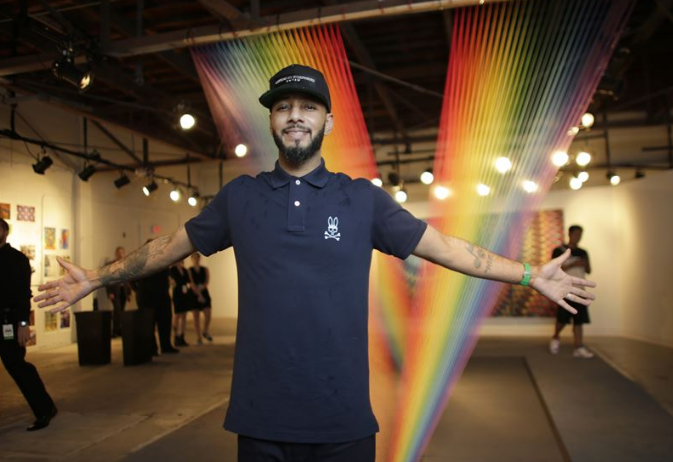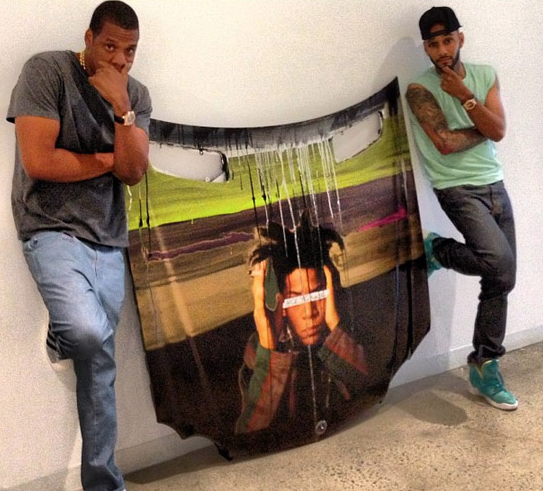With a plethora of musical accolades to his name, Swizz Beatz looks to revolutionize the world of art.
Words: Khari Clarke
“I’m not even finished in here, I’m changing all this stuff out,” Swizz Beatz says, surveying the room. “I’m going to make it even crazier in here, it’s too clean.” Swizz sits leisurely in his workspace, in the heart of Chelsea, the mecca of New York’s contemporary art scene. His fifth-story suite triples as a gallery, office and a studio, which at the time of our meet, was in the middle of a play-through of Kanye West’s The Life of Pablo album. Kanye’s verses bounce off the stark white walls, bearing the art of several contemporary artists, and passing through a peculiar anthropomorphic zebra sculpture suspended in glass, which he would later explain is a “study piece” by Brooklyn artist, Dustin Yellin. One glance at his collection is proof that art has become more than a part of Swizz’s life—it very visibly is his life.
“Music and art have always been brothers and sisters. Those lines ran parallel for me, but I just chose to express one more than the other,” he explains. Back in 1998, Swizz, a 19-year-old parvenu, was ascending off the meteoric success of his first major production: DMX’s chart topping hit, “Ruff Ryders Anthem.” He purchased his first house with his newly found wealth and with it came the intrinsic desire to adorn the white walls with art. “I couldn’t understand how they were trying to charge me so much for artwork at the time,” he recalls. With no bearings in traversing the art world, Swizz sought guidance. Soon he was holding conversations with gallery owner David Rogath, traveling to Europe to seek counsel from art dealers Enrico Navarro and Tony Shafrazi, as well as becoming the impromptu apprentice of famed illustrator Peter Max. The latter Swizz actually credits for his pseudonym having two z’s, as “Double Z” was the nickname Max affectionately called him.
Growing up in the South Bronx in the culturally rich 1980s afforded Swizz, real name Kasseem Dean, a first-hand view of Hip Hop from its birth. The then-fledging genre was still a long way from being substantiated in the eyes of mainstream America, as well as becoming the multi-billion dollar industry it is today, and Swizz was enveloped by Hip Hop’s blossoming art scene. Keith Haring’s handball court murals, Fab Five Freddy’s giant “Campbell’s Soup” subway painting—an homage to famed pop artist Andy Warhol—and more were all the backdrop of Swizz’s formative years. The ever-presence of this beguiling revolution had such an impact on a young Swizz, albeit more subconsciously than anything. “It wasn’t something I was praising at the time because we had it so readily around us, but it was always was in me,” he explained. By the early age of seven, Dean was scampering around the vicinity of his East 156th Street apartment doing graffiti under the tag name “Loco,” a name given to him by older guys in his neighborhood. “I would do stupid s*it: tag cabs, cop cars,” he says as he reclines in his seat with a smirk.
Over years of honing his art knowledge, Swizz developed some gravitas in the art realm, establishing himself as an erudite art collector, and evolving from his juvenile graffiti into a more conservative art form. Now a 37-year-old, world-renowned super producer, Swizz uses visual art as a catharsis. “I paint big canvases, but I do them more as my therapy,” he said. Painting provides him with a solitude that’s atypical of the music industry, which requires the constant collaboration of artists, producers, and engineers for the creative process to work. “Art is the only time I have alone—by myself.”
You will not find his pieces in a museum any time soon and if you do, you probably won’t know they’re his. “I only give my work out to charities, I only give my work out to hospitals for visuals and I kind of do it anonymously.” Swizz’s unwavering respect for art prevents him from creating shows centering on his own creations, as he views himself a humble visitor in the art world. That’s not to say he’s never considered it; he’s quick to admit he honestly hasn’t figured out how to. “I don’t know how to sell my work, and second I think it’s harder for me to put on an exhibit for myself because I’m already successful,” he divulges.
Though painting is a mainstay in Swizz’s lengthy repertoire, he has recast his focus in recent years, creating avenues for artists seeking exposure. Swizz started “The Dean Collection,” both a movement and his own personal collection of art. “I used to tell people, I would buy art for the wrong reasons. The things I would buy [were] mainly based on status and value for a portfolio,” he admits. “That’s why I put rules on The Dean Collection. Anything that goes into The Dean Collection I can never sell. I don’t own it anymore, my kids own it.” The collection itself is a culmination of over 10 years of art buying, and includes works by luminaries in contemporary art such as Kehinde Wiley and KAWS.
He’s also used The Dean Collection brand to host his “No Commission” art fair, which he inaugurated at last year’s Art Basel in Miami. No Commission is a clever double entendre, as not only is entry to the event free, but artists featured are able to keep 100 percent of their earnings—a gesture largely unheard of in the art world. “I was just collecting art to build a museum for my kids, and ended up helping thousands of artist get up on their feet. I raised over $1.5 million at my last art fair and the artists got to keep all of that.” It’s testament to Swizz’s adoration and respect for art. “Art should be free for people to see, period,” he said. “It stimulates your mind, it helps the culture; it helps the world! Not everything can be a business. Certain things you have to draw the line on.”
This sentiment is what granted Swizz a position on the esteemed board of Brooklyn Museum, and an invitation to Harvard’s coveted, invitation-only Owner/President Management class which is comprised of over 140 international business owners in his class alone.
Swizz knows the absence of his celebrated musical contributions is palpable, but these days he’s thinking longevity. “Me, making time for my education and me, making time for new chapters in my life is more important than any f*cking beat I done did.”





